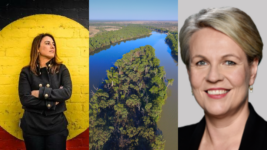Plibersek’s Murray Darling Reform Bill Completely Excludes First Nations Water Rights

The Murray Darling Basin is the most important river system on the continent. The waters traverse four southeastern states and the Australian Capital Territory. And the region, which currently has a population of 2.3 million people, is also home to over 40 different First Nations groups.
The millennium drought, which consisted of the years leading up to the Black Summer bushfires of 2019-20, as well as an overallocation of waters to private industry, left many of the Aboriginal communities without water just prior to the unprecedented fires, and then rain fell in the region.
The Water Act 2007 (Cth) is the legislation that governs the Murray Darling Basin, and it lays the foundation for what became the Basin Plan 2012 (Cth).
While the Water Amendment (Restoring Our Rivers) Bill 2023 (Cth) is before the Senate and if passed, will facilitate the plan’s implementation.
“At last year’s federal election, Labor made a promise to deliver the Murray Darling Basin Plan in full, as it was designed and in line with the science,” environment minister Tanya Plibersek told parliament on introducing the bill in September.
“With this legislation today, we are fulfilling that promise to the river system and to every Australian who depends on it.”
Yet, Senator Lidia Thorpe and the Murray Lower Darling Rivers Indigenous Nations (MLDRIN) are speaking out against the amendment, as despite the neglect that Aboriginal communities living along the basin have been served of late, it makes no improvement to Indigenous water rights.
Dispossession from water access
“Since time immemorial, the knowledge and expertise of First Peoples has kept the lands and waters in the Murray Darling Basin in optimal health, while sustaining the cultural, social, and economic wellbeing of communities who live there,” said Senator Thorpe in a 13 November statement.
“This bill as it stands represents the latest iteration of the colonial government’s exclusion of First Peoples from water management and the denial of our sovereignty and rights to care for Country,” the Djab Wurrung Gunnai Gunditjmara woman continued.
Thorpe was on the Senate Standing Committee on Environment and Communications, which reviewed the bill. The inquiry report recommends that the plan set out in the legislation should be implemented by 31 December 2026.
The senator added additional notes to the report, which outlined that there is an urgent need to overhaul basin management, and the new legislation does not deal with the health of the rivers, and nor does it try to improve the social, economic and cultural outcomes for populations living along it.
“First Peoples in the basin have enduring sovereign rights and cultural obligations to manage and care for our lands of waters,” said Thorpe, and she added that these rights are contained in the UN Declaration of the Rights of Indigenous Peoples (UNDRIP), which should be reflected in the bill.
The guts of the bill
The bill’s explanatory memorandum outlines that over allocation of water and the impact of drought revealed the need for stricter governance of the basin, which led to the Act, and the subsequent 2012 plan that was agreed to by all jurisdictions and now needs updating and implementation.
“The Basin Plan sets the amount of water that can be taken from the basin each year, leaving an environmentally sustainable level for the rivers, lakes and wetlands and plants and animals,” the document states. And it adds that the plan “ensures water quality and salinity levels” are managed.
The amendment seeks to remove all barriers to establishing a plan in the region, delivering on a 450 gigalitre water target, the removal of impediments to achieving such targets, and it proposes to ensure that water makes it to high value floodplain forests.
But as Thorpe points out, the colonial government proposals result in the further “exclusion of First Peoples from water management and denial of our sovereignty and rights to care for Country”. Her people only own 0.2 percent of available surface water and the bill does nothing to improve this.
According to the senator, both PM Anthony Albanese and Plibersek have made explicit commitments regarding the improvement of First Nations access to waterways, yet this legislation does nothing to address water justice for the Indigenous peoples of the basin.
Denial of Indigenous rights
MLDRIN is a self-determined First Nations organisation that represents over 20 Indigenous Nations in the across the southern basin.
In a 13 November statement, the group outlined that the bill discriminates against First Peoples as it does not address the rights that have been recognised at the international level.
Indeed, rather than improve the situation in the basin, after recent memory can recall rivers running dry, bottled water having to be trucked into towns, along with the repeated fish kills occurring in the riverways, Plibersek’s legislation basically denies First Nations rights.
“The Water Act 2007 and the Restoring our Rivers Bill fail to recognise our rights as First Nations people,” outlined MLDRIN chair Grant Rigney. “Now is the time for the senate to right the wrongs of the original Act.”
The Water Act amendment is likely to be up for debate in the Senate next week. And MLDRIN has underscored that it is about time that the UNDRIP rights are reflected in the law, so that Aboriginal water entitlements are respected.
A delegation of representatives from the First Nations communities living in the basin region travelled to Canberra on Thursday to hear how the annual $40 million allocated to the Aboriginal Water Entitlement Program will be distributed, so these communities can buy water.
“The Australian parliament has an opportunity, right now, to demonstrate its commitment to addressing the rights and interests of the basin’s 40 plus First Nations,” added water lawyer Dr Emma Carmody to the statement.
“Reform at the national level would also send a strong signal to all states and territories to follow suite and take meaningful steps to address Indigenous water injustice in their respective jurisdictions.”
Way past time
Over 50 legal professionals and academics signed a 14 November open letter, which maintained that despite ongoing rounds of reforms and policies to prevent the overextraction of waters from the Murray Darling Basin, no water safeguards have been established for the First Peoples of the region.
“This has culminated in legal and policy frameworks that almost entirely deprive First Nations peoples of any decision-making power over water management processes that affect their Country, communities, agency and wellbeing,” the open letter continues.
The academics and lawyers further outline that the only attempt to address the First Peoples of the region in the legislation is to set up a framework so that these communities can be involved in consultation in relation to any future development projects in the region.
And the letter makes clear that this legislation does nothing for Aboriginal communities in the area, stating that “at best, this silence amounts to a tacit endorsement of the abysmal status quo,” while “at worst, it serves to further entrench a water management framework” that excludes First Peoples.
MLDRIN further stresses that as the federal government failed at establishing the Voice to Parliament, the least it can do is grant First Peoples the water rights which are already theirs. And Thorpe assures that it is not too late for the government to honour its passed promises.
“I urge the government to amend the bill to address the recommendations made by the Senate committee, as well as further recommendations made by myself… to strengthen First Peoples rights and ensure the health of the rivers is restored,” the senator ended.







